×
![]()
bnatt400: Instance-to-Instance Comparison Results
| Type: | Instance |
| Submitter: | Tatsuya Akutsu |
| Description: | Model to identify a singleton attractor in a Boolean network, applications in computational systems biology. Solved by SCIP 3.0 with SoPlex 1.7.0 in half an hour. A Intel Core2 Extreme CPU X9659 @3.00GHz was used. |
| MIPLIB Entry |
Parent Instance (bnatt400)
All other instances below were be compared against this "query" instance.  |
 |
 |
 |
 |
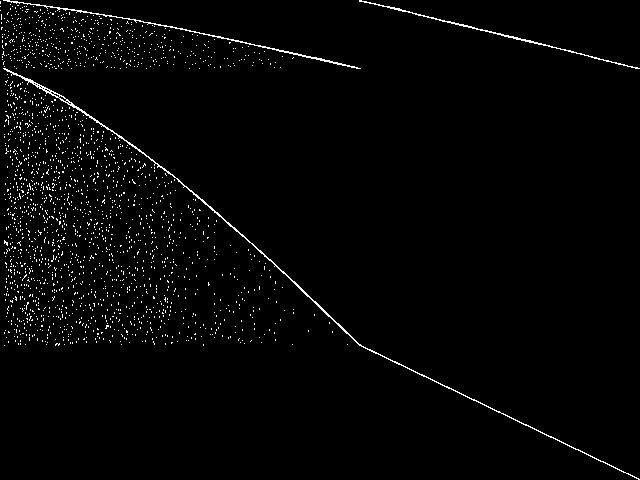 |
|
Raw
This is the CCM image before the decomposition procedure has been applied.
|
Decomposed
This is the CCM image after a decomposition procedure has been applied. This is the image used by the MIC's image-based comparisons for this query instance.
|
Composite of MIC Top 5
Composite of the five decomposed CCM images from the MIC Top 5.
|
Composite of MIPLIB Top 5
Composite of the five decomposed CCM images from the MIPLIB Top 5.
|
Model Group Composite Image
Composite of the decomposed CCM images for every instance in the same model group as this query.
|
MIC Top 5 Instances
These are the 5 decomposed CCM images that are most similar to decomposed CCM image for the the query instance, according to the ISS metric.  |
Decomposed
These decomposed images were created by GCG.
|
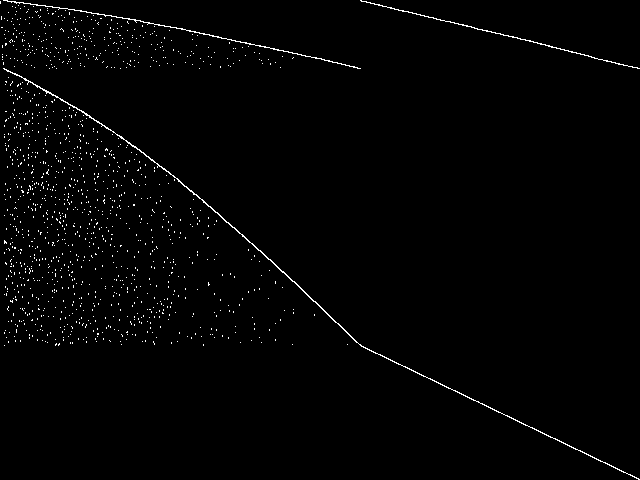 |
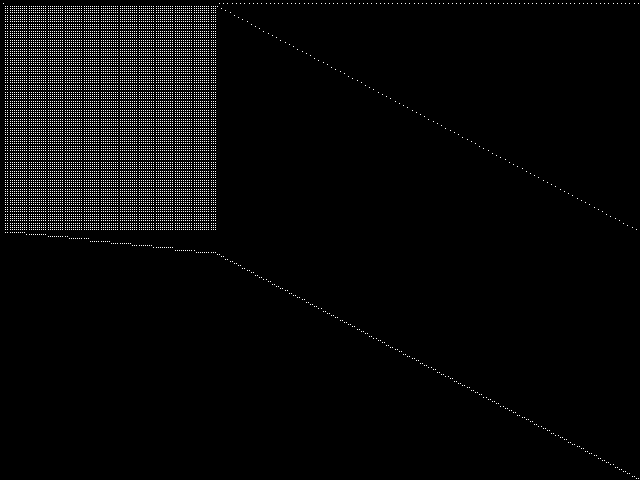 |
 |
 |
 |
| Name | bnatt500 [MIPLIB] | prod2 [MIPLIB] | prod1 [MIPLIB] | dcmulti [MIPLIB] | neos-5192052-neckar [MIPLIB] | |
|
Rank / ISS
The image-based structural similarity (ISS) metric measures the Euclidean distance between the image-based feature vectors for the query instance and all other instances. A smaller ISS value indicates greater similarity.
|
1 / 0.338 | 2 / 1.036 | 3 / 1.065 | 4 / 1.085 | 5 / 1.091 | |
|
Raw
These images represent the CCM images in their raw forms (before any decomposition was applied) for the MIC top 5.
|
 |
 |
 |
 |
 |
MIPLIB Top 5 Instances
These are the 5 instances that are most closely related to the query instance, according to the instance statistic-based similarity measure employed by MIPLIB 2017  |
Decomposed
These decomposed images were created by GCG.
|
 |
 |
 |
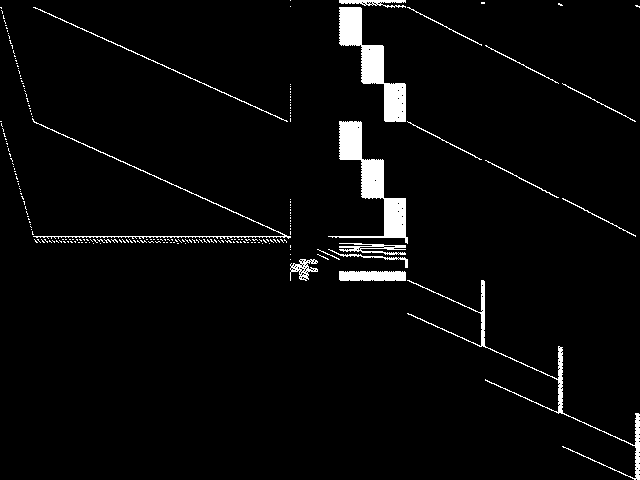 |
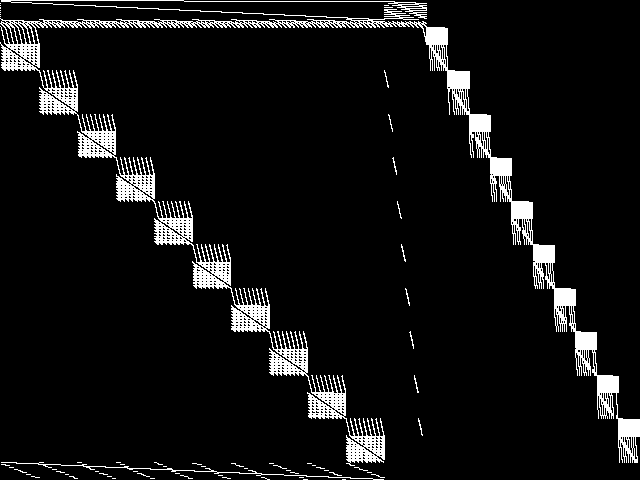 |
| Name | bnatt500 [MIPLIB] | supportcase3 [MIPLIB] | s1234 [MIPLIB] | neos-5178119-nalagi [MIPLIB] | circ10-3 [MIPLIB] | |
|
Rank / ISS
The image-based structural similarity (ISS) metric measures the Euclidean distance between the image-based feature vectors for the query instance and all model groups. A smaller ISS value indicates greater similarity.
|
1 / 0.338 | 79 / 1.272 | 499 / 1.607 | 618 / 1.688 | 811 / 2.006 | |
|
Raw
These images represent the CCM images in their raw forms (before any decomposition was applied) for the MIPLIB top 5.
|
 |
 |
 |
 |
 |
Instance Summary
The table below contains summary information for bnatt400, the five most similar instances to bnatt400 according to the MIC, and the five most similar instances to bnatt400 according to MIPLIB 2017.
| INSTANCE | SUBMITTER | DESCRIPTION | ISS | RANK | |
|---|---|---|---|---|---|
| Parent Instance | bnatt400 [MIPLIB] | Tatsuya Akutsu | Model to identify a singleton attractor in a Boolean network, applications in computational systems biology. Solved by SCIP 3.0 with SoPlex 1.7.0 in half an hour. A Intel Core2 Extreme CPU X9659 @3.00GHz was used. | 0.000000 | - |
| MIC Top 5 | bnatt500 [MIPLIB] | Tatsuya Akutsu | We are submitting ILP data for identification of a singletonattractor in a Boolean newtork, which is a well-known problemin computational systems biology.This problem is known to be NP-hard and we developed a methodto transform an instance of the problem to an integer linearprogram (ILP).We used ILPs from artificially generated Boolean networks ofindegree 3.The size of the networks are: 350, 400, 500.Even for the case of 500, we could not find a solution within6 hours using CPLEX 11.2 on a PC with XEON 5470 3.33GHz CPU.(This ILP corresponds to the case of size=350.File format is (zipped) CPLEX LP format.)The details of the method appeared in:T. Akutsu, M. Hayashida and T. Tamura, Integer programming-basedmethods for attractor detection and control of Boolean networks,Proc. The combined 48th IEEE Conference on Decision and Controland 28th Chinese Control Conference (IEEE CDC/CCC 2009), 5610-5617, 2009. | 0.338358 | 1 |
| prod2 [MIPLIB] | MIPLIB submission pool | Imported from the MIPLIB2010 submissions. | 1.036391 | 2 | |
| prod1 [MIPLIB] | MIPLIB submission pool | Imported from the MIPLIB2010 submissions. | 1.064936 | 3 | |
| dcmulti [MIPLIB] | MIPLIB submission pool | Imported from the MIPLIB2010 submissions. | 1.084791 | 4 | |
| neos-5192052-neckar [MIPLIB] | Jeff Linderoth | (None provided) | 1.091465 | 5 | |
| MIPLIB Top 5 | bnatt500 [MIPLIB] | Tatsuya Akutsu | We are submitting ILP data for identification of a singletonattractor in a Boolean newtork, which is a well-known problemin computational systems biology.This problem is known to be NP-hard and we developed a methodto transform an instance of the problem to an integer linearprogram (ILP).We used ILPs from artificially generated Boolean networks ofindegree 3.The size of the networks are: 350, 400, 500.Even for the case of 500, we could not find a solution within6 hours using CPLEX 11.2 on a PC with XEON 5470 3.33GHz CPU.(This ILP corresponds to the case of size=350.File format is (zipped) CPLEX LP format.)The details of the method appeared in:T. Akutsu, M. Hayashida and T. Tamura, Integer programming-basedmethods for attractor detection and control of Boolean networks,Proc. The combined 48th IEEE Conference on Decision and Controland 28th Chinese Control Conference (IEEE CDC/CCC 2009), 5610-5617, 2009. | 0.338358 | 1 |
| supportcase3 [MIPLIB] | Michael Winkler | MIP instances collected from Gurobi forum with unknown application Solved with ParaSCIP in 1551 seconds with 71 solvers(72 cores). | 1.272193 | 79 | |
| s1234 [MIPLIB] | Siwei Sun | These models come from my cryptographic research and are used to search for the best differential characteristics of the round-reduced versions of the block cipher Serpent with the mixed-integer programming technique. For all the models, including S1234.lp, S56701.lp, S456701.lp, I have found a feasible solution in the corresponding mst file. The challenge is that can we find better solutions or can we find the best solutions. | 1.606848 | 499 | |
| neos-5178119-nalagi [MIPLIB] | Jeff Linderoth | (None provided) | 1.687981 | 618 | |
| circ10-3 [MIPLIB] | M. Winkler | Instance from the 2010 SAT conference pseudo-Boolean competition | 2.006403 | 811 |
bnatt400: Instance-to-Model Comparison Results
| Model Group Assignment from MIPLIB: | bnatt |
| Assigned Model Group Rank/ISS in the MIC: | 1 / 0.466 |
MIC Top 5 Model Groups
These are the 5 model group composite (MGC) images that are most similar to the decomposed CCM image for the query instance, according to the ISS metric.  |
These are model group composite (MGC) images for the MIC top 5 model groups.
|
 |
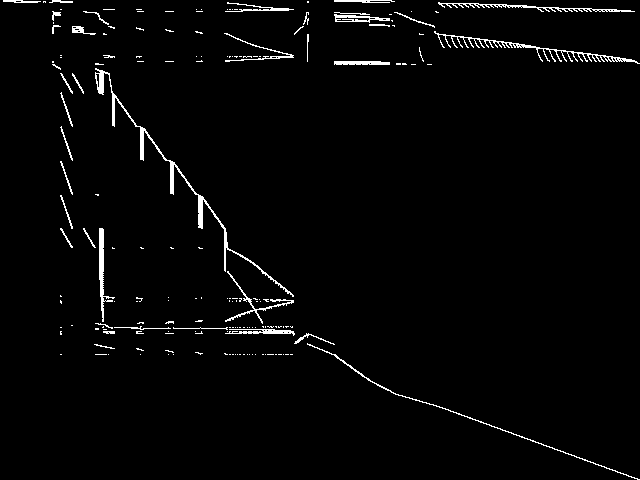 |
 |
 |
 |
| Name | bnatt | oocsp-racks | neos-pseudoapplication-74 | scp | mc | |
|
Rank / ISS
The image-based structural similarity (ISS) metric measures the Euclidean distance between the image-based feature vectors for the query instance and all other instances. A smaller ISS value indicates greater similarity.
|
1 / 0.466 | 2 / 1.450 | 3 / 1.563 | 4 / 1.665 | 5 / 1.705 |
Model Group Summary
The table below contains summary information for the five most similar model groups to bnatt400 according to the MIC.
| MODEL GROUP | SUBMITTER | DESCRIPTION | ISS | RANK | |
|---|---|---|---|---|---|
| MIC Top 5 | bnatt | Tatsuya Akutsu | We are submitting ILP data for identification of a singletonattractor in a Boolean newtork, which is a well-known problemin computational systems biology.This problem is known to be NP-hard and we developed a methodto transform an model of the problem to an integer linearprogram (ILP).We used ILPs from artificially generated Boolean networks ofindegree 3.The size of the networks are: 350, 400, 500.Even for the case of 500, we could not find a solution within6 hours using CPLEX 11.2 on a PC with XEON 5470 3.33GHz CPU.(This ILP corresponds to the case of size=350.File format is (zipped) CPLEX LP format.)The details of the method appeared in:T. Akutsu, M. Hayashida and T. Tamura, Integer programming-basedmethods for attractor detection and control of Boolean networks,Proc. The combined 48th IEEE Conference on Decision and Controland 28th Chinese Control Conference (IEEE CDC/CCC 2009), 5610-5617, 2009. | 0.466149 | 1 |
| oocsp-racks | Gleb Belov | These are the models from MiniZinc Challenges 2012-2016 (see www.minizinc.org), compiled for MIP WITH INDICATOR CONSTRAINTS using the develop branch of MiniZinc and CPLEX 12.7.1 on 30 April 2017. Thus, these models can only be handled by solvers accepting indicator constraints. For models compiled with big-M/domain decomposition only, see my previous submission to MIPLIB.To recompile, create a directory MODELS, a list lst12_16.txt of the models with full paths to mzn/dzn files of each model per line, and say$> ~/install/libmzn/tests/benchmarking/mzn-test.py -l ../lst12_16.txt -slvPrf MZN-CPLEX -debug 1 -addOption "-timeout 3 -D fIndConstr=true -D fMIPdomains=false" -useJoinedName "-writeModel MODELS_IND/%s.mps" Alternatively, you can compile individual model as follows: $> mzn-cplex -v -s -G linear -output-time ../challenge_2012_2016/mznc2016_probs/zephyrus/zephyrus.mzn ../challenge_2012_2016/mznc2016_p/zephyrus/14__8__6__3.dzn -a -timeout 3 -D fIndConstr=true -D fMIPdomains=false -writeModel MODELS_IND/challenge_2012_2016mznc2016_probszephyruszephyrusmzn-challenge_2012_2016mznc2016_probszephyrus14__8__6__3dzn.mps | 1.450257 | 2 | |
| neos-pseudoapplication-74 | Jeff Linderoth | (None provided) | 1.562942 | 3 | |
| scp | Shunji Umetani | This is a random test model generator for SCP using the scheme of the following paper, namely the column cost c[j] are integer randomly generated from [1,100]; every column covers at least one row; and every row is covered by at least two columns. see reference: E. Balas and A. Ho, Set covering algorithms using cutting planes, heuristics, and subgradient optimization: A computational study, Mathematical Programming, 12 (1980), 37-60. We have newly generated Classes I-N with the following parameter values, where each class has five models. We have also generated reduced models by a standard pricing method in the following paper: S. Umetani and M. Yagiura, Relaxation heuristics for the set covering problem, Journal of the Operations Research Society of Japan, 50 (2007), 350-375. You can obtain the model generator program from the following web site. https://sites.google.com/site/shunjiumetani/benchmark | 1.664672 | 4 | |
| mc | F. Ortega, L. Wolsey | Fixed cost network flow problems | 1.705206 | 5 |

